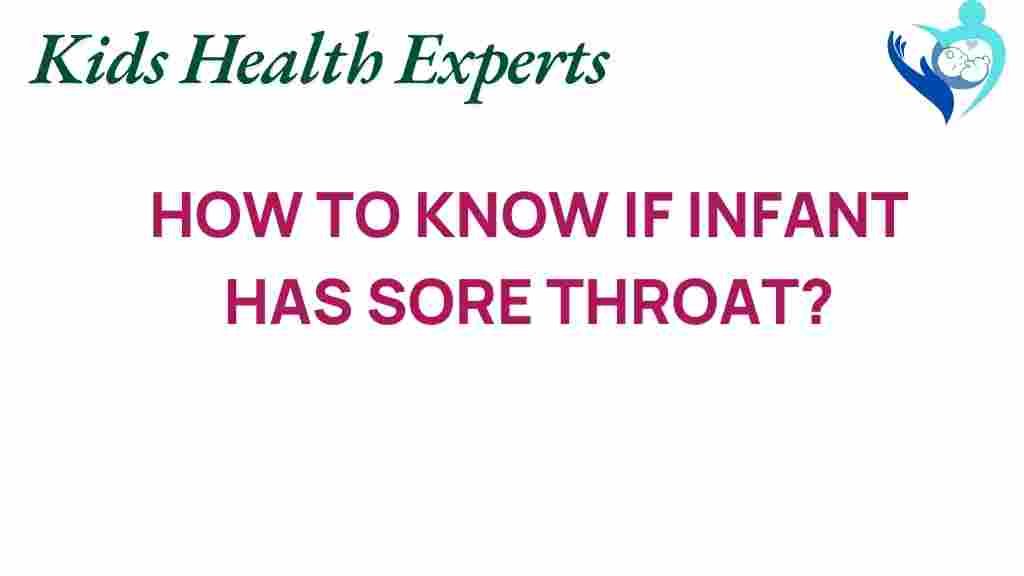Unveiling the Signs: How to Identify a Sore Throat in Infants
As parents, one of the most challenging aspects of raising an infant is deciphering their cues when they are unwell. A sore throat can be a common yet concerning issue for young children. Recognizing the symptoms of throat discomfort in infants is crucial for ensuring their health and well-being. In this article, we will explore how to identify a sore throat in infants, what symptoms to look for, and when to seek pediatric care.
Understanding Sore Throat in Infants
A sore throat, or pharyngitis, can cause discomfort in infants, leading to various symptoms that may indicate underlying issues. Infants may not be able to express their discomfort verbally, making it essential for parents to be observant and proactive. Symptoms of a sore throat can range from mild to severe and may be associated with other conditions.
Common Symptoms of a Sore Throat in Infants
Identifying a sore throat in infants requires careful attention to their behavior and physical signs. Here are some common symptoms to watch for:
- Crying and Irritability: Increased crying may indicate that your infant is in pain or discomfort.
- Difficulty Eating or Drinking: Infants may refuse to feed or may cry during feeding due to throat pain.
- Fever: A rise in temperature can accompany a sore throat, indicating an infection or illness.
- Drooling: Excessive drooling can be a sign of throat discomfort, as swallowing may be painful.
- Changes in Sleep Patterns: Discomfort may disrupt sleep, causing your infant to wake more frequently.
- Bad Breath: Foul-smelling breath can sometimes occur with throat infections.
- Swollen Glands: You may notice swelling in your infant’s neck, indicating an infection.
Step-by-Step: How to Assess Your Infant’s Symptoms
If you suspect that your infant may have a sore throat, follow these steps to assess their condition:
- Observe Behavior: Pay attention to changes in your infant’s mood, feeding habits, and sleeping patterns.
- Check for Fever: Use a digital thermometer to check your baby’s temperature. A fever over 100.4°F (38°C) may warrant medical attention.
- Look for Physical Signs: Examine your infant’s throat if possible. Look for redness or swelling, but avoid putting your fingers in their mouth as this can cause gagging.
- Assess Feeding: Note if your infant is having trouble feeding or seems to be in pain while swallowing.
- Monitor Drooling: Increased drooling can indicate discomfort and may require further evaluation.
When to Seek Medical Attention
Understanding when to seek help for your infant’s sore throat is vital. Consider contacting a pediatrician if:
- Your infant is under three months old and has a fever.
- The fever persists for more than 24 hours.
- You notice difficulty breathing or swallowing.
- Your infant appears dehydrated (fewer wet diapers, dry mouth).
- There are signs of a severe infection, such as a rash or unusual lethargy.
Always trust your instincts as a parent. If you feel that something is off with your infant’s health, it’s best to consult a healthcare provider.
Home Remedies and Care for a Sore Throat
While it’s essential to consult a healthcare professional for a definitive diagnosis, there are a few home remedies that can help soothe your infant’s sore throat:
- Fluids: Keep your infant hydrated with breast milk, formula, or water (if age-appropriate).
- Humidity: Use a cool-mist humidifier in their room to help ease throat discomfort.
- Comfort: Hold and comfort your infant, as physical closeness can provide emotional support.
- Warm Compress: A warm washcloth on your infant’s throat may offer soothing relief.
However, avoid giving honey to infants under one year of age due to the risk of botulism.
Preventive Measures for Infant Health
Prevention is always better than cure. Here are some tips to help prevent sore throats and other illnesses in infants:
- Hand Hygiene: Wash your hands frequently and teach older siblings to do the same.
- Avoid Sick Contacts: Keep your infant away from individuals who are ill.
- Immunizations: Stay up-to-date with your infant’s vaccinations to protect them from infections.
- Healthy Environment: Ensure a smoke-free and clean environment to reduce respiratory irritants.
Understanding the Importance of Pediatric Care
Pediatric care is vital for monitoring and maintaining your infant’s health. Regular check-ups can help identify potential health issues early on. Your pediatrician can guide you through various aspects of infant care, including nutrition, developmental milestones, and vaccinations.
For more information on pediatric care, you can visit this resource.
Conclusion
Identifying a sore throat in infants can be challenging for parents due to their inability to communicate effectively. By being observant of symptoms such as crying, fever, and feeding difficulties, parents can take proactive steps to ensure their child’s health. Seeking medical attention when necessary and employing home remedies can help manage throat discomfort effectively.
Always prioritize open communication with your pediatrician to address any concerns regarding your infant’s health. Remember, your instincts as a parent are invaluable in protecting your child’s well-being.
For more articles on infant health and care tips, feel free to explore our website.
This article is in the category Conditions and created by KidsHealthExperts Team
